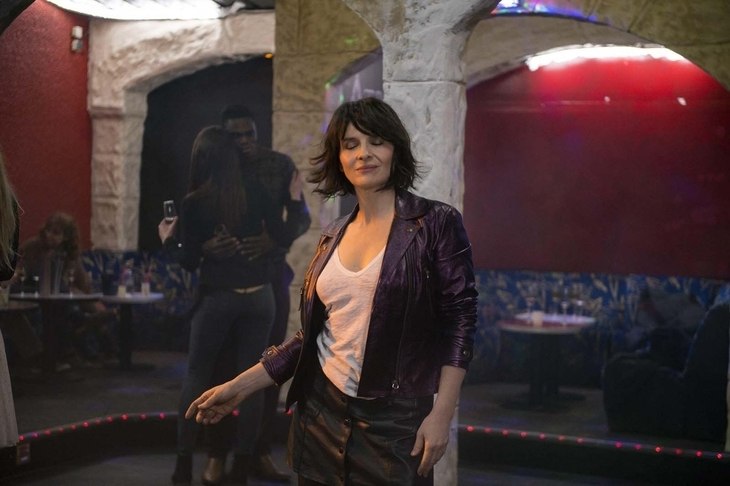Here in the English-speaking world, the hours after work and before dinner are known as the ‘reverse commute’. We spend these hours standing on trains, sitting in cars, or pedaling for our lives. Over there in France, these hours are called the ‘cinq à sept’. Although they may also involve being pressed up against other people, the sequence of postures is different. Strange, then, that so many skilled workers have left France. Stranger, still, that so few skilled foreign workers have moved there. You’d think they’d be banging at the door.
Isabelle, the heroine of Claire Denis’ Let the Sunshine In, is so committed to the ‘cinq à sept’ that she does it round the clock. As an artist, Isabelle (Juliette Binoche) is slightly unconventional in the deeply conventional way of people who believe they are wildly unconventional, for there is nothing more conventional than being the Other Woman. As what the French call a ‘woman of a certain age’, Isabelle is increasingly fearful that her age as a lover might be over. She is lonely, and wants love that is ‘authentic’ and ‘natural’, rather than stylish and contrived. Like Lili von Shtupp in Blazing Saddles, she’s ‘tired, tired of playing the game’, and tired of lovers who are ‘always coming and going / And going and coming / And always too soon’.
Indeed, Isabelle’s despairing confession to a girlfriend—‘It’s like my love life is behind me’—sounds like a set-up for a punchline that never comes, as in Lili von Shtupp’s joke: ‘I’ve had my fill of love / From below and above.’ But this is not an Anglo-Saxon film, where sex is about giggles, the romantic temperature reusables that of last night’s hot-water bottle, and the linguistic thrills are limited to what the English, in an admission that the French do it better, call double entendres. Love is a language, and this film’s language is elaborate, its courting almost courtly. The script, by Claire Denis and the novelist Christine Angot, is distantly descended from ’Fragments d’un Discours Amoreux’ by the endlessly self-conscious Roland Barthes. Bridget Jones’ Diary this is not.
If Isabelle’s discourse is becoming increasingly fragmentary, it is because she is losing the plot. As she ages, she loses the plum roles, and her control over the casting and the mise-en-scène, to her lovers. Vincent (Xavier Beauvois) is a piggish banker with whom Isabelle achieves orgasm by telling herself that he is an ‘old bastard’. Another lover, an unnamed actor (Nicolas Duvauchelle), admits to getting ‘a bit violent’ towards his wife and controls Isabelle’s interest by contriving pointlessly discursive scenarios; in the end, she is driven mad less with desire than intellectual frustration. Both men promise less than they deliver, for both make it clear that they will never leave their wives. Isabelle also sleeps with her ex-husband, which is an ingenious form of adultery; and a working-class man that she picks up in a provincial bar, which is a form of social faithlessness to her Parisian art-world friends.
The traditional French female lead has sex impulsively, then ignores her lovers impassively. Claire Denis reverses the roles, and exposes the power dynamic. Isabelle wants love, but she cannot find it. A trip to the country, beautifully lit in winter sunshine, throws her dilemma into sharp relief. ‘It’s all yours!’ she shouts at her male friends as they kill the moment by intellectualizing about ‘Nature that looks like Nature’. When she meet Sylvain in a bar, there is a promise of a breakthrough. But Isabelle cannot escape her role. The character that she plays has become her second nature.
Agnès Godard’s camerawork is luminous and Cartesian. The mind and the body are joined, but retain their singularity despite their physical coupling. The theatre of seduction is staged like a painting, while the twitches and sidelong glances through which the lovers betray themselves are captured close-up. Juliette Binoche excelled as a similar character, a lonely actress whose career is faltering, in Olivier Assayas’ Clouds of Sils Maria (2014). That film, though, had the icy emotional clarity of its Alpine setting. This one has a painful warmth. Binoche feels it, and plays it with commendable honesty. No American star would consent to showing the old make-up in the grooves of her crow’s feet. The soundtrack is wonderful and intimate, too. The British saxophonist Julian Siegel evokes the lost romance of jazz and existentialism with hints of the tough lyricism of John Coltrane’s tone, and more explicit echoes of Miles Davis’ In A Silent Way, which intercuts heart-racing anticipation and post-coital tristesse.
The twist and the tristesse come when Isabelle seeks the help of a psychic. The psychic, played by Gerard Depardieu with such relish that he almost upends the whole film. We first see him dumped by his lover; a psychic who cannot read the future. He reads Isabelle like a book, and sticks to his script. She should remain ‘open’; he uses the English word, presumably to conceptualize this new element in her role. Though she should continue to indulge old flames and pursue new ones, she should not despair. A more ‘authentic’ and ‘substantial’ lover is coming her way, and she should make herself ready by cultivating a ‘beautiful sun inside’ herself. That phrase is the film’s original French title, Un Beau Soleil Interieur. Calling it Let the Sunshine In, as though Isabelle’s cerebrally rich crisis resembles a hippy’s freakout in Hair, traduces Claire Denis’ graceful, thoughtful and authentic film.
Depardieu, as physically authentic and substantial as a side of beef, and blatantly fraudulent as he waves a crystal over a photograph of one of her lovers, is just another seducer. Denis, who grew up in Africa and made the excellent White Material (2009) with Isabelle Huppert as a white farmer in Africa, has sent Isabelle to meet her ‘Mistah Kurtz’. This one resembles Marlon Brando’s turn in Apocalypse Now, bloated and self-serving. Isabelle’s quest for love has made her a hollow woman. The pain is in the details, and so too the pleasure. I can think of few better ways of passing the late afternoon than watching Let the Sunshine In. Just a few.


















